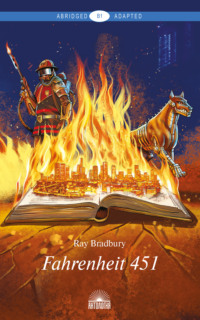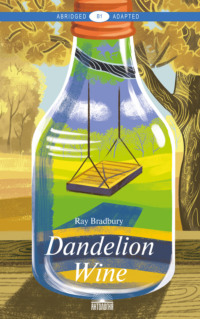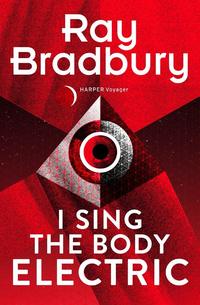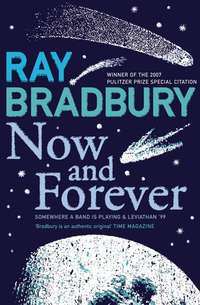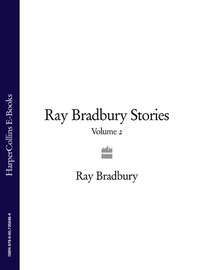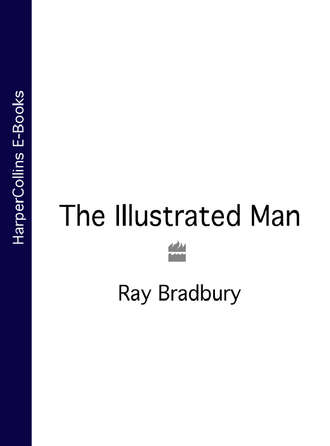
Полная версия
The Illustrated Man
It was so very odd. Space, thousands of miles of space, and these voices vibrating in the centre of it. No one visible at all, and only the radio waves quivering and trying to quicken other men into emotion.
‘Are you angry, Hollis?’
‘No.’ And he was not. The abstraction had returned and he was a thing of dull concrete, forever falling nowhere.
‘You wanted to get to the top all your life, Hollis. You always wondered what happened. I put the black mark on you just before I was tossed out myself.’
‘That isn’t important,’ said Hollis. And it was not. It was gone. When life is over it is like a flicker of bright film, an instant on the screen, all of its prejudices and passions condensed and illumined for an instant on space, and before you could cry out, ‘There was a happy day, there a bad one, there an evil face, there a good one,’ the film burned to a cinder, the screen went dark.
From this outer edge of his life, looking back, there was only one remorse, and that was only that he wished to go on living. Did all dying people feel this way, as if they had never lived? Did life seem that short, indeed, over and done before you took a breath? Did it seem this abrupt and impossible to everyone, or only to himself, here, now, with a few hours left to him for thought and deliberation?
One of the other men, Lespere, was talking. ‘Well, I had me a good time: I had a wife on Mars, Venus, and Jupiter. Each of them had money and treated me swell. I got drunk and once I gambled away twenty thousand dollars.’
But you’re here now, thought Hollis. I didn’t have any of those things. When I was living, I was jealous of you, Lespere; when I had another day ahead of me I envied you your women and your good times. Women frightened me and I went into space, always wanting them and jealous of you for having them, and money, and as much happiness as you could have in your own wild way. But now, falling here, with everything over, I’m not jealous of you any more, because it’s over for you as it is for me, and right now it’s like it never was. Hollis craned his face forward and shouted into the telephone.
‘It’s all over, Lespere!’
Silence.
‘It’s just as if it never was, Lespere!’
‘Who’s that?’ Lespere’s faltering voice.
‘This is Hollis.’
He was being mean. He felt the meanness, the senseless meanness of dying. Applegate had hurt him; now he wanted to hurt another. Applegate and space had both wounded him.
‘You’re out here, Lespere. It’s all over. It’s just as if it had never happened, isn’t it?’
‘No.’
‘When anything’s over, it’s just like it never happened. Where’s your life any better than mine, now? Now is what counts. Is it any better? Is it?’
‘Yes, it’s better!’
‘How?’
‘Because I got my thoughts, I remember!’ cried Lespere, far away, indignant, holding his memories to his chest with both hands.
And he was right. With a feeling of cold water rushing through his head and body, Hollis knew he was right. There were differences between memories and dreams. He had only dreams of things he had wanted to do, while Lespere had memories of things done and accomplished. And this knowledge began to pull Hollis apart, with a slow, quivering precision.
‘What good does it do you?’ he cried to Lespere. ‘Now? When a thing’s over it’s not good any more. You’re no better off than me.’
‘I’m resting easy,’ said Lespere. ‘I’ve had my turn. I’m not getting mean at the end, like you.’
‘Mean?’ Hollis turned the word on his tongue. He had never been mean, as long as he could remember, in his life. He had never dared to be mean. He must have saved it all of these years for such a time as this. ‘Mean.’ He rolled the word into the back of his mind. He felt tears start into his eyes and roll down his face. Someone must have heard his gasping voice.
‘Take it easy, Hollis.’
It was, of course, ridiculous. Only a minute before he had been giving advice to others, to Stimson; he had felt a braveness which he had thought to be the genuine thing, and now he knew that it had been nothing but shock and the objectivity possible in shock. Now he was trying to pack a lifetime of suppressed emotion into an interval of minutes.
‘I know how you feel, Hollis,’ said Lespere, now twenty thousand miles away, his voice fading. ‘I don’t take it personally.’
But aren’t we equal? he wondered. Lespere and I? Here, now? If a thing’s over, it’s done, and what good is it? You die anyway. But he knew he was rationalizing, for it was like trying to tell the difference between a live man and a corpse. There was a spark in one, and not in the other – an aura, a mysterious element.
So it was with Lespere and himself; Lespere had lived a good full life, and it made him a different man now, and he, Hollis, had been as good as dead for many years. They came to death by separate paths and, in all likelihood, if there were kinds of death, their kinds would be as different as night from day. The quality of death, like that of life, must be of an infinite variety, and if one has already died once, then what was there to look for in dying for good and all, as he was now?
It was a second later that he discovered his right foot was cut sheer away. It almost made him laugh. The air was gone from his suit again. He bent quickly, and there was blood, and the meteor had taken flesh and suit away to the ankle. Oh, death in space was most humorous. It cut you away, piece by piece, like a black and invisible butcher. He tightened the valve at the knee, his head whirling into pain, fighting to remain aware, and with the valve tightened, the blood retained, the air kept, he straightened up and went on falling, falling, for that was all there was left to do.
‘Hollis?’
Hollis nodded sleepily, tired of waiting for death.
‘This is Applegate again,’ said the voice.
‘Yes.’
‘I’ve had time to think. I listened to you. This isn’t good. It makes us bad. This is a bad way to die. It brings all the bile out. You listening, Hollis?’
‘Yes.’
‘I lied. A minute ago. I lied. I didn’t blackball you. I don’t know why I said that. Guess I wanted to hurt you. You seemed the one to hurt. We’ve always fought. Guess I’m getting old fast and repenting fast. I guess listening to you be mean made me ashamed. Whatever the reason, I want you to know I was an idiot too. There’s not an ounce of truth in what I said. To hell with you.’
Hollis felt his heart begin to work again. It seemed as if it hadn’t worked for five minutes, but now all of his limbs began to take colour and warmth. The shock was over, and the successive shocks of anger and terror and loneliness were passing. He felt like a man emerging from a cold shower in the morning, ready for breakfast and a new day.
‘Thanks, Applegate.’
‘Don’t mention it. Up your nose, you bastard.’
‘Hey,’ said Stone.
‘What?’ Hollis called across space; for Stone, of all of them, was a good friend.
‘I’ve got myself into a meteor swarm, some little asteroids.’
‘Meteors?’
‘I think it’s the Myrmidone cluster that goes out past Mars and in toward Earth once every five years. I’m right in the middle. It’s like a big kaleidoscope. You get all kinds of colours and shapes and sizes. God, it’s beautiful, all that metal.’
Silence.
‘I’m going with them,’ said Stone. ‘They’re taking me off with them. I’ll be damned.’ He laughed.
Hollis looked to see, but saw nothing. There were only the great diamonds and sapphires and emerald mists and velvet inks of space, with God’s voice mingling among the crystal fires. There was a kind of wonder and imagination in the thought of Stone going off in the meteor swarm, out past Mars for years and coming in toward Earth every five years, passing in and out of the planet’s ken for the next million centuries, Stone and the Myrmidone cluster eternal and unending, shifting and shaping like the kaleidoscope colours when you were a child and held the long tube to the sun and gave it a twirl.
‘So long, Hollis,’ Stone’s voice, very faint now. ‘So long.’
‘Good luck,’ shouted Hollis across thirty thousand miles.
‘Don’t be funny,’ said Stone, and was gone.
The stars closed in.
Now all the voices were fading, each on his own trajectory, some to Mars, others into farthest space. And Hollis himself … He looked down. He, of all the others, was going back to Earth alone.
‘So long.’
‘Take it easy.’
‘So long, Hollis.’ That was Applegate.
The many good-byes. The short farewells. And now the great loose brain was disintegrating. The components of the brain which had worked so beautifully and efficiently in the skull case of the rocket ship firing through space were dying one by one; the meaning of their life together was falling apart. And as a body dies when the brain ceases functioning, so the spirit of the ship and their long time together and what they meant to one another was dying. Applegate was now no more than a finger blown from the parent body, no longer to be despised and worked against. The brain was exploded, and the senseless, useless fragments of it were far scattered. The voices faded and now all of space was silent. Hollis was alone, falling.
They were all alone. Their voices had died like echoes of the words of God spoken and vibrating in the starred deep. There went the captain to the Moon; there Stone with the meteor swarm; there Stimson; there Applegate toward Pluto; there Smith and Turner and Underwood and all the rest, the shards of the kaleidoscope that had formed a thinking pattern for so long, hurled apart.
And I? thought Hollis. What can I do? Is there anything I can do now to make up for a terrible and empty life? If only I could do one good thing to make up for the meanness I collected all these years and didn’t even know was in me! But there’s no one here but myself, and how can you do good all alone? You can’t. Tomorrow night I’ll hit Earth’s atmosphere.
I’ll burn, he thought, and be scattered in ashes all over the continental lands. I’ll be put to use. Just a little bit, but ashes are ashes and they’ll add to the land.
He fell swiftly, like a bullet, like a pebble, like an iron weight, objective, objective all of the time now, not sad or happy or anything, but only wishing he could do a good thing now that everything was gone, a good thing for just himself to know about.
When I hit the atmosphere, I’ll burn like a meteor.
‘I wonder,’ he said, ‘if anyone’ll see me?’
The small boy on the country road looked up and screamed. ‘Look, Mom, look! A falling star!’
The blazing white star fell down the sky of dusk in Illinois.
‘Make a wish,’ said his mother. ‘Make a wish.’
The Illustrated Man turned in the moonlight. He turned again … and again … and again …
The Other Foot
When they heard the news they came out of the restaurants and cafés and hotels and looked at the sky. They lifted their dark hands over their upturned white eyes. Their mouths hung wide. In the hot noon for thousands of miles there were little towns where the dark people stood with their shadows under them, looking up.
In her kitchen Hattie Johnson covered the boiling soup, wiped her thin fingers on a cloth, and walked carefully to the back porch.
‘Come on, Ma! Ma, come on – you’ll miss it!’
‘Hey, Mom!’
Three little Negro boys danced around in the dusty yard, yelling. Now and then they looked at the house frantically.
‘I’m coming,’ said Hattie, and opened the screen door. ‘Where you hear this rumour?’
‘Up at Jones’s, Ma. They say a rocket’s coming, first one in twenty years, with a white man in it!’
‘What’s a white man? I never seen one.’
‘You’ll find out,’ said Hattie. ‘Yes indeed, you’ll find out.’
‘Tell us about one, Ma. Tell like you did.’
Hattie frowned. ‘Well, it’s been a long time. I was a little girl, you see. That was back in 1965.’
‘Tell us about a white man, Mom!’
She came and stood in the yard, looking up at the blue clear Martian sky with the thin white Martian clouds, and in the distance the Martian hills broiling in the heat. She said at last, ‘Well, first of all, they got white hands.’
‘White hands!’ The boys joked, slapping each other.
‘And they got white arms.’
‘White arms!’ hooted the boys.
‘And white faces.’
‘White faces! Really?’
‘White like this, Mom?’ The smallest threw dust on his face, sneezing. ‘This way?’
‘Whiter than that,’ she said gravely, and turned to the sky again. There was a troubled thing in her eyes, as if she was looking for a thundershower up high, and not seeing it made her worry. ‘Maybe you better go inside.’
‘Oh, Mom!’ they stared at her in disbelief. ‘We got to watch, we just got to. Nothing’s going to happen, is it?’
‘I don’t know. I got a feeling, is all.’
‘We just want to see the ship and maybe run down to the port and see that white man. What’s he like, huh, Mom?’
‘I don’t know. I just don’t know,’ she mused, shaking her head.
‘Tell us some more!’
‘Well, the white people live on Earth, which is where we all come from, twenty years ago. We just up and walked away and came to Mars and set down and built towns and here we are. Now, we’re Martians instead of Earth people. And no white men’ve come up here in all that time. That’s the story.’
‘Why didn’t they come up, Mom?’
‘Well, ’cause. Right after we got up here, Earth got in an atom war. They blew each other up terribly. They forgot us. When they finished fighting, after years, they didn’t have any rockets. Took them until recently to build more. So here they come now, twenty years later, to visit.’ She gazed at her children numbly and then began to walk. ‘You wait here. I’m going down the line to Elizabeth Brown’s house. You promise to stay?’
‘We don’t want to but we will.’
‘All right, then.’ And she ran off down the road.
At the Browns’ she arrived in time to see everybody packed into the family car. ‘Hey there, Hattie! Come on along!’
‘Where you going?’ she said, breathlessly running up.
‘To see the white man!’
‘That’s right,’ said Mr Brown seriously. He waved at his load. ‘These children never saw one, and I almost forgot.’
‘What you going to do with that white man?’ asked Hattie.
‘Do?’ said everyone. ‘Why – just look at him, is all.’
‘You sure?’
‘What else can we do?’
‘I don’t know,’ said Hattie. ‘I just thought there might be trouble.’
‘What kind of trouble?’
‘You know,’ said Hattie vaguely, embarrassed. ‘You ain’t going to lynch him?’
‘Lynch him?’ Everyone laughed. Mr Brown slapped his knee. ‘Why, bless you, child, no! We’re going to shake his hand. Ain’t we, everyone?’
‘Sure, sure!’
Another car drove up from another direction and Hattie gave a cry. ‘Willie!’
‘What you doing ’way down here? Where’re the kids?’ shouted her husband angrily. He glared at the others. ‘You going down like a bunch of fools to see that man come in?’
‘That appears to be just right,’ agreed Mr Brown, nodding and smiling.
‘Well, take your guns along,’ said Willie. ‘I’m on my way home for mine right now!’
‘Willie!’
‘You get in this car, Hattie.’ He held the door open firmly, looking at her until she obeyed. Without another word to the others he roared the car down the dusty road.
‘Willie, not so fast!’
‘Not so fast, huh! We’ll see about that.’ He watched the road tear under the car. ‘What right they got coming up here this late? Why don’t they leave us in peace? Why didn’t they blow themselves up on that old world and let us be?’
‘Willie, that ain’t no Christian way to talk.’
‘I’m not feeling Christian,’ he said savagely, gripping the wheel. ‘I’m just feeling mean. After all them years of doing what they did to our folks – my mom and dad, and your mom and dad – You remember? You remember how they hung my father on Knockwood Hill and shot my mother? You remember? Or you got a memory that’s short like the others?’
‘I remember,’ she said.
‘You remember Dr Phillips and Mr Burton and their big houses, and my mother’s washing shack, and Dad working when he was old, and the thanks he got was being hung by Dr Phillips and Mr Burton. Well,’ said Willie, ‘the shoe’s on the other foot now. We’ll see who gets laws passed against him, who gets lynched, who rides the back of streetcars, who gets segregated in shows. We’ll just wait and see.’
‘Oh, Willie, you’re talking trouble.’
‘Everybody’s talking. Everybody’s thought on this day, thinking it’d never be. Thinking. What kind of day would it be if the white man ever came up here to Mars? But here’s the day, and we can’t run away.’
‘Ain’t you going to let the white people live up here?’
‘Sure.’ He smiled, but it was a wide, mean smile, and his eyes were mad. ‘They can come up and live and work here, why, certainly. All they got to do to deserve it is live in their own small part of town, the slums, and shine our shoes for us, and mop up our trash, and sit in the last row in the balcony. That’s all we ask. And once a week we hang one or two of them. Simple.’
‘You don’t sound human, and I don’t like it.’
‘You’ll have to get used to it,’ he said. He braked the car to a stop before the house and jumped out. ‘Find my guns and some rope. We’ll do this right.’
‘Oh, Willie,’ she wailed, and just sat there in the car while he ran up the steps and slammed the front door.
She went along. She didn’t want to go along, but he rattled around in the attic, cursing like a crazy man until he found four guns. She saw the brutal metal of them glittering in the black attic, and she couldn’t see him at all, he was so dark; she heard only his swearing, and at last his long legs came climbing down from the attic in a shower of dust, and he stacked up bunches of brass shells and blew out the gun chambers and clicked shells into them, his face stern and heavy and folded in upon the gnawing bitterness there. ‘Leave us alone,’ he kept muttering, his hands flying away from him suddenly, uncontrolled. ‘Leave us blame along, why don’t they?’
‘Willie, Willie.’
‘You too – you too.’ And he gave her the same look, and a pressure of his hatred touched her mind.
Outside the window the boys gabbled to each other. ‘White as milk, she said. White as milk.’
‘White as a stone, like chalk you write with.’
Willie plunged out of the house. ‘You children come inside. I’m locking you up. You ain’t seeing no white man, you ain’t talking about them, you ain’t doing nothing. Come on now.’
‘But, Daddy –’
He shoved them through the door and went and fetched a bucket of paint and a stencil and from the garage a long thick hairy rope coil into which he fashioned a hangman’s knot, very carefully, watching the sky while his hands felt their way at their task.
And then they were in the car, leaving bolls of dust behind them down the road. ‘Slow up, Willie.’
‘This is no slowing-up time,’ he said. ‘This is a hurrying time, and I’m hurrying.’
All along the road people were looking up in the sky, or climbing in their cars, or riding in cars, and guns were sticking up out of some cars like telescopes sighting all the evils of a world coming to an end.
She looked at the guns. ‘You been talking,’ she accused her husband.
‘That’s what I been doing,’ he grunted, nodding. He watched the road, fiercely. ‘I stopped at every house and I told them what to do, to get their guns, to get paint, to bring rope and be ready. And here we all are, the welcoming committee, to give them the key to the city. Yes, sir!’
She pressed her thin dark hands together to push away the terror growing in her now, and she felt the car bucket and lurch around other cars. She heard the voices yelling, Hey Willie, look! and hands holding up ropes and guns as they rushed by! and mouths smiling at them in the swift rushing.
‘Here we are,’ said Willie, and braked the car into dusty halting and silence. He kicked the door open with a big foot and, laden with weapons, stepped out, lugging them across the airport meadow.
‘Have you thought, Willie?’
‘That’s all I done for twenty years. I was sixteen when I left Earth, and I was glad to leave,’ he said. ‘There wasn’t anything there for me or you or anybody like us. I’ve never been sorry I left. We’ve had peace here, the first time we ever drew a solid breath. Now, come on.’
He pushed through the dark crowd which came to meet him.
‘Willie, Willie, what we gonna do?’ they said.
‘Here’s a gun,’ he said. ‘Here’s a gun. Here’s another.’ He passed them out with savage jabs of his arms. ‘Here’s a pistol. Here’s a shotgun.’
The people were so close together it looked like one dark body with a thousand arms reaching out to take the weapons. ‘Willie, Willie.’
His wife stood tall and silent by him, her fluted lips pressed shut, and her large eyes wet and tragic. ‘Bring the paint,’ he said to her. And she lugged a gallon can of yellow paint across the field to where, at that moment, a trolley car was pulling up, with a fresh-painted sign on its front, TO THE WHITE MAN’S LANDING, full of talking people who got off and ran across the meadow, stumbling, looking up. Women with picnic boxes, men with straw hats, in shirt sleeves. The streetcar stood humming and empty. Willie climbed up, set the paint cans down, opened them, stirred the paint, rested a brush, drew forth a stencil and climbed up on a seat.
‘Hey, there!’ the conductor came around behind him, his coin changer jangling. ‘What do you think you’re doing? Get down off there!’
‘You see what I’m doing. Keep your shirt on.’
And Willie began the stencilling in yellow paint. He dabbed on an F and an O and an R with terrible pride in his work. And when he finished it the conductor squinted up and read the fresh glinting yellow words, FOR WHITES: REAR SECTION. He read it again. FOR WHITES. He blinked. REAR SECTION. The conductor looked at Willie and began to smile.
‘Does that suit you?’ asked Willie, stepping down.
Said the conductor, ‘That suits me just fine, sir.’
Hattie was looking at the sign from outside, and holding her hands over her breasts.
Willie returned to the crowd, which was growing now, taking size from every auto that groaned to a halt, and every new trolley car which squealed around the bend from the nearby town.
Willie climbed up on a packing box. ‘Let’s have a delegation to paint every streetcar in the next hour. Volunteers?’
Hands leapt up.
‘Get going!’
They went.
‘Let’s have a delegation to fix theatre seats, roped off, the last two rows for whites.’
More hands.
‘Go on!’
They ran off.
Willie peered around, bubbled with perspiration, panting with exertion, proud of his energy, his hand on his wife’s shoulder who stood under him looking at the ground with her downcast eyes. ‘Let’s see now,’ he declared. ‘Oh yes. We got to pass a law this afternoon; no intermarriages!’
‘That’s right,’ said a lot of people.
‘All shoeshine boys quit their jobs today.’
‘Quittin’ right now!’ Some men threw down the rags they carried, in their excitement, all across town.
‘Got to pass a minimum wage law, don’t we?’
‘Sure!’
‘Pay them white folks at least ten cents an hour.’
‘That’s right!’
The mayor of the town hurried up. ‘Now look here, Willie Johnson. Get down off that box!’
‘Mayor, I can’t be made to do nothing like that.’
‘You’re making a mob, Willie Johnson.’
‘That’s the idea.’
‘The same thing you always hated when you were a kid. You’re no better than some of those white men you yell about!’



